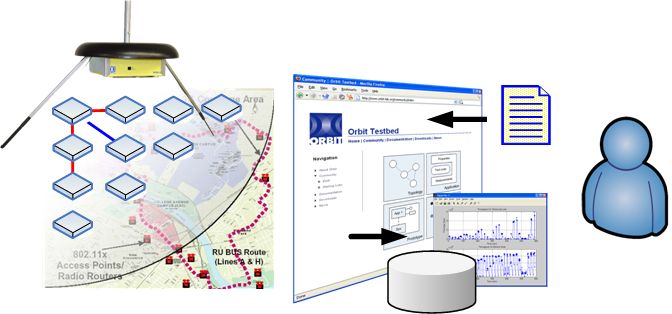| Version 20 (modified by , 20 years ago) ( diff ) |
|---|
Welcome
ORBIT is a two-tier laboratory emulator/field trial network testbed designed to achieve reproducibility of experimentation, while also supporting evaluation of protocols and applications in real-world settings.
The laboratory-based wireless network emulator uses a novel approach involving a large two-dimensional grid of 400 802.11x radio nodes which can be dynamically interconnected into specified topologies with reproducible wireless channel models.
Once the basic protocol or application concepts have been validated on the lab emulator platform, users can migrate their experiments to the field trial network which provides a configurable mix of both high-speed cellular (3G) and 802.11x wireless access in a real-world setting.
Orbit is seeded by a $5.45M/4yr grant from the NSF under the Networking Research Testbeds (NRT) program. The project is a collaborative effort between several university research groups in the NY/NJ region: Rutgers, Columbia, and Princeton, along with industrial partners Lucent Bell Labs, IBM Research and Thomson. Orbit is being developed and operated by WINLAB, Rutgers University.
The testbed will be available for remote or on-site access by other research groups nationally. Additional research partners and testbed equipment/software contributors are actively sought from both industry and academia.
Starting Points for Experimenters
Starting Points for Developers
- Projects — Various software packages used in Orbit
- NodeHandler — The Orbit Experiment Control Framework
- OML — The Orbit Measurement Library
- OTG — The Orbit Traffic Measurement Framework
- Other Traffic Generators
- Using AODV
- How to tag stable releases
- How to launch your applications using nodeHandler
Attachments (1)
- orbit-overview.jpg (35.4 KB ) - added by 20 years ago.
Download all attachments as: .zip

